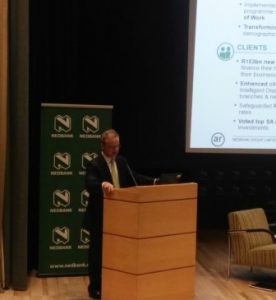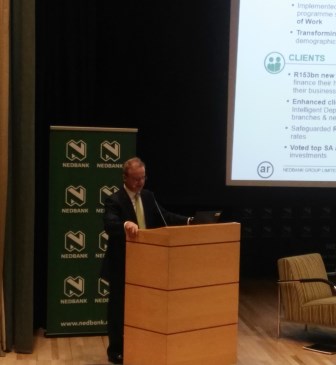This is the message from Nedbank chief information officer Fred Swanepoel, last Friday at the bank’s annual financial results for 2017.

The bank has installed 59 software robots and plans to have 200 in place by the end of the year. Swanepoel also indicated they were spending R2bn on technology investment.
“When we look at the expected implementations and the natural attrition we are going to suffer, we think that there is more than adequate room for us not to have any mass retrenchments on account of robotics.
We are looking to have some of that displacement offset in the growth we will receive,” he said.
“With about 32 000 staff, our natural attrition rate is about 3 000 per year. When we look at a three-year period, we don’t think that robotics will take up more than one year of that natural attrition.”
During the presentation, humanoid robot, which it calls Pepper (costing between R400 000 to R500 000) made its maiden appearance as it bid guests farewell in a Vernecular- ‘hambane kahle’.
Nedbank’s chief financial officer, Raisibe Morathi, said the bank currently didn’t see any risk from the move to change the Constitution to allow for expropriation of land without compensation.
This follows the debate currently tabled in Parliament on Expropriation of Land without Compensation, that has the country and business on its toes.
“We clearly understand the need for land reform. The challenge is that no one knows how it will work. We are unclear at this stage as to exactly what is meant by expropriation of land without compensation in a manner that doesn’t harm the economy of food security.
That is open to such wide interpretation currently. “So we look forward to being part of the process to ensure that a sensible outcome for the benefit of all South Africans is achieved,” pointed out Mike Brown, Nedbank GCE.
Brown also confirmed the bank is one of the seven local and international institutions that lent the troublesome Eskom a hefty R20bn, without indicating how much Nedbank did contribute to the loan.
“We will be launching a revamped loyalty and rewards programme in the second half of this year. That has always been part of our strategy – probably less so actually to respond to what a Discovery or Bank Zero are doing,” says Ciko Thomas, Nedbank’s retail and business banking executive, following reports of new entrants in the market and what plans do they have going forward, etc.
Brown said he was optimistic about the 2018 outlook. “While during 2017 consumer and business confidence had slumped to the lowest levels in many years, contributing to a slowdown in lending and transactional activities, particularly in our corporate and investment and wealth businesses, there was a marked change in confidence after the election of Cyril Ramaphosa as ANC President and, subsequently, as President of South Africa.
Challenges remain but we expect the political and macro conditions in South Africa to continue to improve this year. This, combined with the ongoing turnaround at ETI, should help Nedbank deliver a stronger performance in 2018.”
Despite operating in tough economical challenges, the bank profit grew by 2,8%, net asset value grew by 7,3%, dividends up by 7,1% and return on equity was steady at 16,4.
The Old Mutual managed separation process is expected to be materially concluded in 2018.
Old Mutual plc previously stated that a new SA holding company, to be named Old Mutual Limited (OML), would retain a strategic minority shareholding in Nedbank Group after the implementation of the managed separation.
OML will do a primary listing on the JSE and a secondary listing on the London Stock Exchange at the earliest opportunity in 2018, following the publication of Old Mutual plc’s 2017 full-year results.
The decrease in OML’s shareholding in Nedbank Group will be achieved through the unbundling of Nedbank Group ordinary shares to OML’s shareholders.
This will result in OML, immediately after the implementation of the unbundling, holding a 19,9% strategic minority shareholding in Nedbank Group.
The unbundling will occur at an appropriate time and in an orderly manner, said the report.

